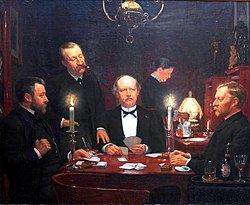Ombré

|
|
| Origin | Spain |
|---|---|
| Alternative names | Hombre, Lomber |
| Type | Trick-taking |
| Players | 3 (4-5) |
| Skills required | Tactics and strategy |
| Cards | 40 cards |
| Deck | Spanish |
| Play | Counter-clockwise |
| Playing time | 20 min. |
| Random chance | Difficult |
| Related games | |
| Loo, Nap, Euchre, Skat | |
Ombre (from Spanish hombre, meaning 'man') is a fast-moving seventeenth-century trick-taking card game for three players. Its history began in Spain around the end of the 16th century as a four-person game. It is one of the earliest card games known in Europe and by far the most classic game of its type, directly ancestral to Euchre, Boston and Solo Whist. Despite its difficult rules, complicated point score and strange foreign terms, it swept Europe in the last quarter of the 17th century, becoming Lomber in Germany, Lumbur in Austria and Ombre (originally pronounced 'umber') in England, occupying a position of prestige similar to contract bridge today.
The historical importance of Ombre in the field of playing cards is the fact that it was the first card game in which a trump suit was established by bidding rather than by the random process of turning the first card of the stock. This game developed from Triunfo, though it was from L'Hombre that the idea of bidding was adopted into other card games such as Skat, and Tarot, which owes Hombre a good portion of its betting system as well. The game continued to be in vogue almost in every corner of Europe from the late 17th through the 18th centuries.
As with most games, Ombre acquired many variations of increasing complexity over the years, until its popularity was eclipsed by the second quarter of the 18th century by a new four player French variant called Quadrille, later displaced by the English Whist. Other lines of descent and hybridization produced games like Preference, Mediator and Twenty-five. Under the name Tresillo, it survived in parts of Spain during the nineteenth century, as Voltarete in Portugal and Brazil, as Rocambor in countries such as Bolivia, Peru, and Colombia in the twentieth century, and it is still played as L’Hombre in Denmark, mostly in Jutland and on the island of Funen, where it is organized by the L'Hombre Union.
...
Wikipedia
